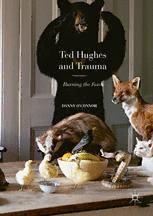
Ted Hughes and Trauma: Burning the Foxes PDF
Preview Ted Hughes and Trauma: Burning the Foxes
Ted Hughes and Trauma Burning the Foxes DANNY O’CONNOR Ted Hughes and Trauma Danny O’Connor Ted Hughes and Trauma Burning the Foxes Danny O’Connor Department of English University of Liverpool Liverpool, United Kingdom ISBN 978-1-137-55791-9 ISBN 978-1-137-55792-6 (eBook) DOI 10.1057/978-1-137-55792-6 Library of Congress Control Number: 2016947458 © The Editor(s) (if applicable) and The Author(s) 2 016 The author(s) has/have asserted their right(s) to be identifi ed as the author(s) of this work in accordance with the Copyright, Design and Patents Act 1988. This work is subject to copyright. All rights are solely and exclusively licensed by the Publisher, whether the whole or part of the material is concerned, specifi cally the rights of translation, reprinting, reuse of illustrations, recitation, broadcasting, reproduction on microfi lms or in any other physical way, and transmission or information storage and retrieval, electronic adaptation, computer software, or by similar or dissimilar methodology now known or hereafter developed. The use of general descriptive names, registered names, trademarks, service marks, etc. in this publication does not imply, even in the absence of a specifi c statement, that such names are exempt from the relevant protective laws and regulations and therefore free for general use. The publisher, the authors and the editors are safe to assume that the advice and information in this book are believed to be true and accurate at the date of publication. Neither the publisher nor the authors or the editors give a warranty, express or implied, with respect to the material contained herein or for any errors or omissions that may have been made. Printed on acid-free paper This Palgrave Macmillan imprint is published by Springer Nature The registered company is Springer-Verlag London Ltd. A CKNOWLEDGMENTS Many people have helped in shaping and creating this book. I would fi rstly like to thank Neil Corcoran for his help and wisdom in getting this proj- ect started. A huge thanks is owed to Deryn Rees-Jones for her tireless support, her remarkable insight and unceasing advocacy for poetry itself. Terry Gifford, Neil Roberts, Ann Skea and Mark Wormald have all been of enormous assistance, answering Hughes-related queries and offering encouragement along the way. Likewise Gillian Gorszewski, whose deep knowledge of Hughes and droll humour has been the necessary measure of many of my arguments. I would like thank my parents for their enor- mous support, without whom this book would not have been possible— my mother, in particular, for introducing me to Hughes. And above all Emma, for putting up with me linking everything back to Ted Hughes. v C ONTENTS 1 Introduction: A Tyrannical Reading of Ted Hughes 1 2 Hughes’s Creaturely Creatures 23 3 Hughes’s Landscape, Lacan’s Real 4 1 4 En Attendant Crow: Hughes with Sartre, Camus and Beckett 59 5 Hughes Meets Bacon, Baskin and the Big Screen 7 9 6 Hughes and War Trauma 99 7 Hughes and the Burning of Literary Criticism 121 8 ‘She Did Life’: England Traumatised 1 41 vii viii CONTENTS 9 Hughes, the Goddess and the ‘Foundational Fantasy’ 163 10 Conclusion: A New Classicism? 183 Bibliography 191 Index 201 1 Introduction: A Tyrannical Reading of Ted Hughes As a student at Pembroke College, Cambridge, Ted Hughes dreamed he was still at his desk, struggling to write his weekly essay when ‘The door opened & a creature came in’, a ‘long skinny’ fox, ‘but erect, & with human hands’. This fox-man had ‘escaped from a fi re’, its skin ‘charred’ and ‘bleeding’ as he crossed the room, placed his hand on the poet’s page and announced, ‘Stop this. You are destroying us’. When he removed his hand from the page what remained was a ‘blood-print’. 1 From this point onward—so the legend goes—Hughes devoted his life to poetry and ‘burning the foxes’ becomes a byword for the destructiveness of liter- ary criticism. As critics, we stand before Hughes’s work with a jerry can of petrol and a packet of matches. He envisions poems as a ‘kind of animal’: they have a ‘vivid life of their own’ that cannot be added or reduced without ‘maim- ing and perhaps even killing them’. 2 The literary critic, serial butcher and immolator, maims and kills by breaking the unity of a poem, investigat- ing its inner workings in the way his empiricist St George of Crow cleaves hearts ‘With a knife-edge of numbers’. 3 Schooled in the eviscerations of Leavisite close reading, one could only have sympathy for a Hughes that feared his own work might be anaesthetised and subject to the same dis- sections, though he claims to have had ‘nearly a sadistic streak’ for such criticism, he also felt that it was ‘deeply destructive’ of himself (L TH 423). Conversely, Neil Roberts has corrected our view of Leavis representing a damaging infl uence on Hughes’s burgeoning poetic talent, arguing that Leavis’s understanding of poetic thinking is actually highly compatible © The Editor(s) (if applicable) and The Author(s) 2016 1 D. O’Connor, Ted Hughes and Trauma, DOI 10.1057/978-1-137-55792-6_1
